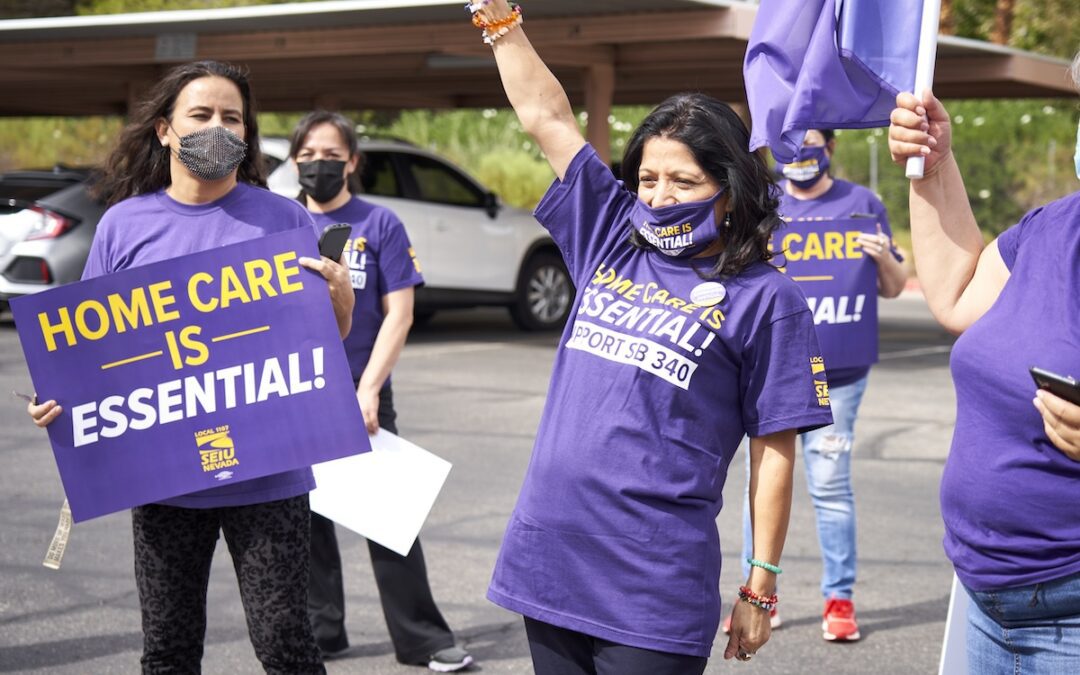
Vice President Kamala Harris gives remarks alongside U.S. President Joe Biden at Prince George’s Community College on August 15, 2024 in Largo, Maryland. (Photo by Anna Moneymaker/Getty Images)
Harris wants to expand the $35 monthly cap on insulin costs and a $2,000 annual cap on out-of-pocket drug costs so that they apply to all Americans, not just seniors on Medicare.
Vice President Kamala Harris plans to build on the work she and President Biden have done to lower prescription drug costs, should she be elected president in November.
Two of her proposals would specifically expand on policies passed by the administration in the Inflation Reduction Act (IRA).
The law implemented a $35 monthly cap on insulin for Medicare recipients, and beginning in 2025, is set to limit Medicare recipients’ out-of-pocket prescription drug costs to $2,000 per year.
As a result of the $35 monthly cap, 11,000 Nevada seniors on Medicare who use insulin are now charged no more than $35 per month for an insulin prescription. An estimated 143,020 seniors in the state are also expected to save $434 a year each due to the $2,000 cap on out-of-pocket drug costs, according to an analysis by the US Department of Health and Human Services.
Harris wants to expand the $35 monthly insulin cap and the $2,000 annual cap on out-of-pocket drug costs so that it applies to all Americans–not just seniors on Medicare.
The Inflation Reduction Act also authorized Medicare to negotiate prices for expensive drugs with pharmaceutical companies for the first time. The negotiations — which used the power of Medicare to lower drug costs for seniors — are expected to save taxpayers about $6 billion when they go into effect in 2026. The new prices for the first 10 selected drugs will be anywhere from 38% to 79% lower than the drugs’ list prices last year, saving seniors on Medicare an estimated $1.5 billion in out-of-pocket costs in 2026 alone.
Another 15 drugs are set to be selected for negotiation and see their prices decrease in 2027, with 15 more following in 2028, and 20 more in 2029 and each year afterwards.
Harris has proposed both accelerating these negotiations and broadening the number of drugs eligible to be negotiated in the first place.
“We have capped the cost of insulin at $35 a month for seniors, capped prescription costs for seniors at $2,000 a year, and allowed Medicare to negotiate drug prices,” Harris wrote earlier this month on Facebook. “As president, I will continue to make health care more affordable for working Americans.”
All of Harris’ plans would require congressional approval, which would only be likely if Democrats win control of the House and Senate in November.
Harris also wants to expand on the federal government’s role in canceling medical debt.
The Biden-Harris administration announced last year that it would develop federal rules that would bar unpaid medical bills from affecting patients’ credit scores.
Barring medical bills from appearing on credit reports would help tens of millions of Americans who have medical debt by eliminating information that can depress their scores, and therefore make it more difficult for them to get a job, rent an apartment, or secure a car loan, for example.
“We believe in a future where the economy works for working people,” Harris said earlier this year. “We are finally making it so that medical debt can no longer be used against your credit score.”
Harris has said she plans to work with states to cancel medical debt for millions of Americans if elected.
Finally, Harris has vowed to increase competition in the pharmaceutical industry, and she wants to start by “cracking down on pharmaceutical companies who block competition and abusive practices by pharmaceutical middlemen who squeeze small pharmacies’ profits and raise costs for consumers.”

New strain of bird flu is detected in a Nevada dairy worker, CDC says
By Mike Stobbe and Jonel Aleccia According to state health officials, the dairy worker was exposed at a farm in Churchill County, in the west...

Wage increase shows early success in stabilizing Nevada home care workforce
Seniors have officially outnumbered children for the first time in US history. But Nevada's new minimum wage increase for care workers offers a...

Registró Nevada Health Link un récord de inscripciones en su período de inscripción abierta de 2025
Se inscribieron más de 110.000 nevadenses, lo que supone la inscripción más numerosa en la historia del mercado en Nevada. Nevada Health Link logró...

Feds approve Nevada public option health insurance plans
In becoming the third state to offer publicly-available health care plans, officials say residents can soon expect lower premiums and improved...

Nevada seniors’ drug costs are now capped at $2,000 per year
The out-of-pocket cost of prescription drugs for Medicare Part D enrollees is now capped at $2,000 per year, thanks to President Joe Biden’s...

Santa Claus celebró Navidad en el hospital Intermountain; recién nacidos reciben una gigantesca bota navideña
Santa Claus hizo entregas especiales a bebés recién nacidos en un centro hospitalario cumpliendo así 15 años de una hermosa tradición decembrina....



